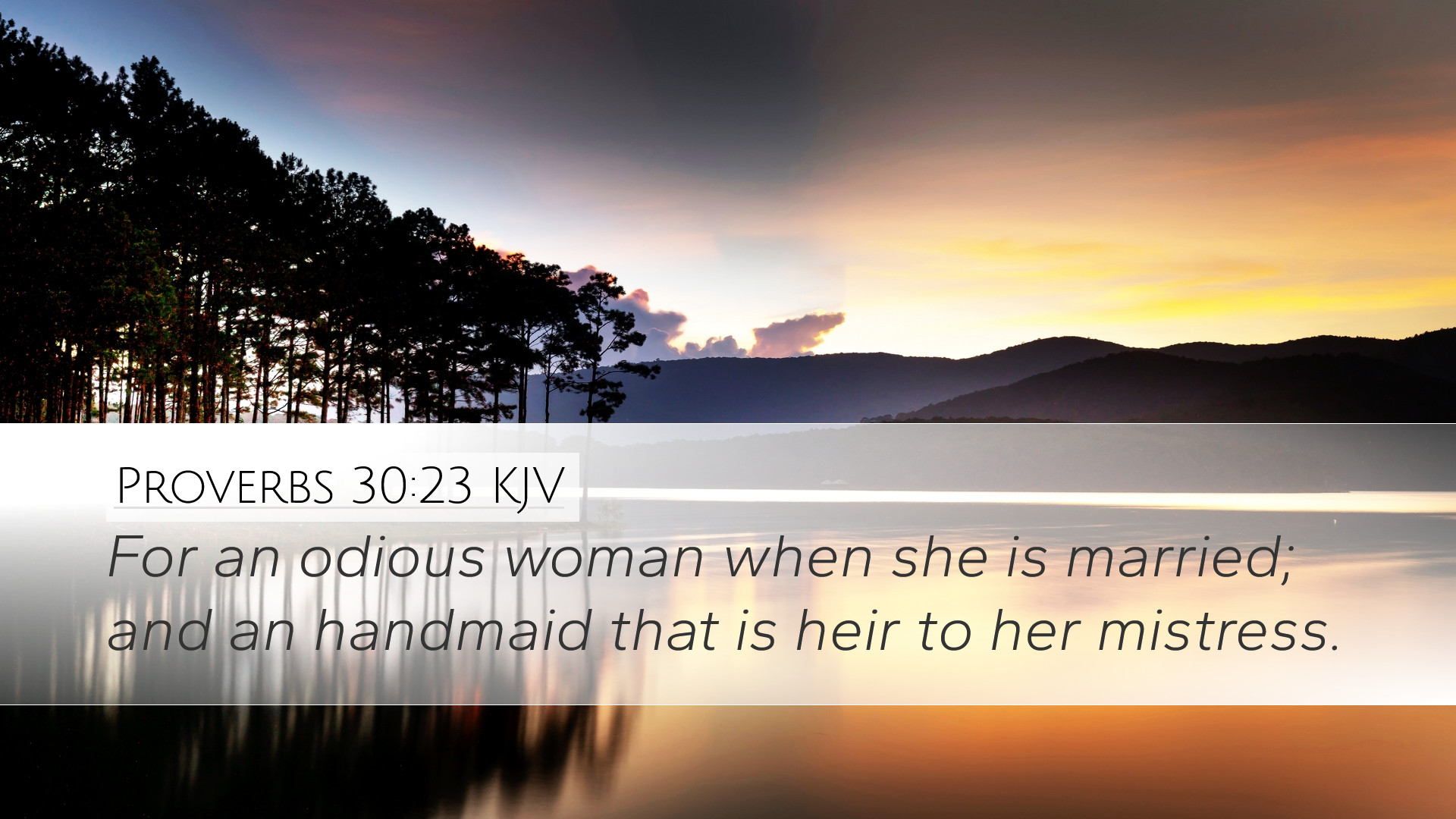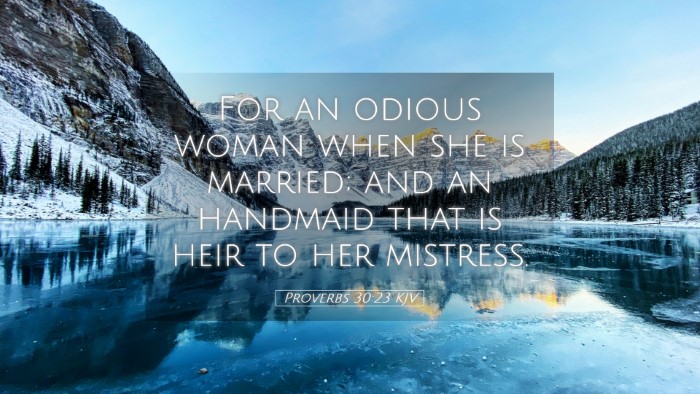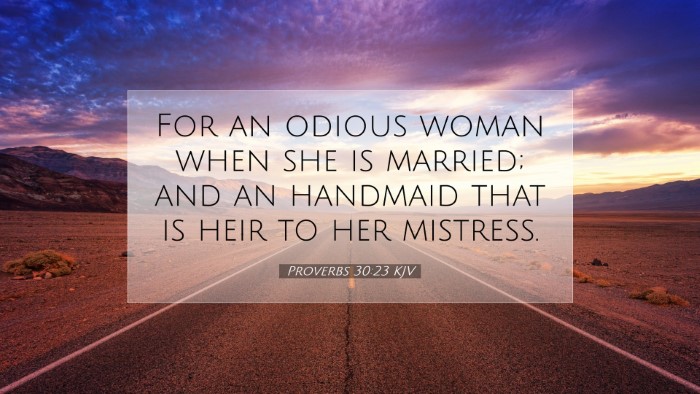Commentary on Proverbs 30:23
Verse: Proverbs 30:23 - "For an odious woman when she is married; and an handmaid that is heir to her mistress." (KJV)
Introduction
Proverbs 30:23 is a verse that encapsulates deep social and relational observations. The verse presents a striking depiction of troubling dynamics within familial and social structures. In this commentary, we explore various perspectives on this verse as presented in classic public domain commentaries by Matthew Henry, Albert Barnes, and Adam Clarke.
Contextual Background
This verse is situated within the larger discourse of Proverbs 30, which is attributed to Agur, son of Jakeh. Agur speaks with a blend of wisdom and personal reflection. The entire chapter speaks to the insignificance and complexity of life, suggesting a recognition of the inherent weaknesses of humanity, including the dynamics of relationships.
Interpretation of the Verse
-
Matthew Henry's Commentary:
Henry emphasizes the gravity of the phrase "an odious woman when she is married." He suggests that an unpleasant, contentious woman, once married, becomes a source of misery, not only for her husband but also affecting the entire household. This unpalatable nature flies in the face of the traditional role and expectation of women and represents a broader warning against the consequences of poor marital choices. He highlights the deep spiritual implications, urging men to seek qualities that align more closely with wisdom and virtue in their choice of partners.
-
Albert Barnes' Commentary:
Barnes points out that an "odious woman" signifies not only a disagreeable personality but also moral and spiritual deficiencies. When a woman with these traits marries, the peace and joy that should define a home are disrupted. This statement serves as a cautionary reminder of the importance of character over mere appearances in relationships. He likens this dynamic to a servant who inherits from her mistress, highlighting how social hierarchies and familial roles can shape one's identity and behavior, underscoring a call to act honorably and responsibly regardless of one's social standing.
-
Adam Clarke's Commentary:
Clarke interprets the phrase "an handmaid that is heir to her mistress" as a complex interplay of social structures. He draws attention to the potential for resentment and rivalry, particularly in hierarchical relationships, such as that between servant and mistress. Clarke states that this creates a critical and often painful tension, where one’s social position can engender feelings of contempt or inadequacy. He highlights the importance of humility and grace in both positions—whether as the mistress or the servant—to mitigate these adverse dynamics and promote harmony.
Thematic Implications
The examination of Proverbs 30:23 through various commentaries reveals thematic concerns that extend beyond the immediate context of marriage and servitude. It touches on the social fabric and the relational dynamics that characterize human interactions.
-
Character Assessment:
A recurrent theme in all three commentaries is the significant impact of character on relationships. An odious woman, regardless of her social standing, presents a cautionary tale about the necessity for all individuals to cultivate personal virtue and integrity.
-
The Role of Social Structures:
The verse also reflects on the power dynamics inherent in social structures. Clarke's mention of social hierarchies serves as a reminder that one's role impacts interpersonal relationships, insinuating that unresolved issues can cause broader social tensions.
-
The Need for Wise Choices:
Both Henry and Barnes underscore the importance of wisdom in relational decisions. Choosing a life partner should involve careful consideration of character and mutual respect, as these choices can have long-lasting impacts on one’s life.
Practical Applications
In light of the insights gathered from these commentaries, there are several practical applications that emerge from Proverbs 30:23:
-
For Pastors:
Pastors are encouraged to teach their congregations about the virtues of character and relational harmony. They should foster environments where individuals reflect on their character and its impact on their relationships.
-
For Students and Theologians:
This verse presents a fertile ground for academic inquiry into the sociology of biblical texts. Students can explore the implications of marriage, social dynamics, and gender roles as presented in biblical wisdom literature.
-
For Bible Scholars:
The rich cultural and historical context in which Proverbs was written opens avenues for deeper scholarly work. Analyzing the socio-economic conditions and gender expectations of the time can enhance our understanding of the text.
Conclusion
Proverbs 30:23 is a profound verse that invites reflection on the interplay between personal character, social structure, and relational outcomes. The commentaries by Henry, Barnes, and Clarke provide a rich tapestry of insights that not only illuminate the text itself but also challenge us to examine our own lives and relationships. Whether we are in positions of authority or servitude, the exhortation remains: to cultivate virtues that lead to honor, dignity, and peace within our homes and communities.


